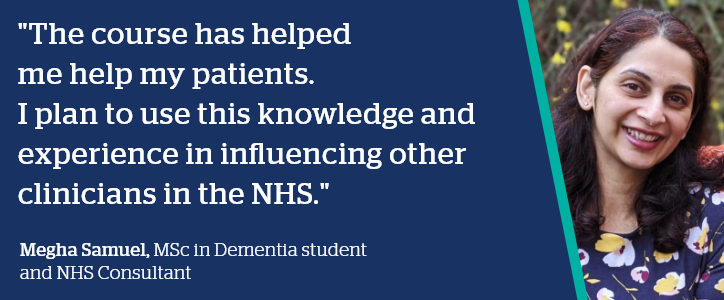We sat down with current MSc in Dementia student Megha Samuel, who's an NHS Consultant and mum of two. She talked to us about what motivated her to study dementia, how she applies insights from the course into her work as a doctor, and how she balances studying with family life.
Tell us about yourself – what do you do for work and what led to your interest in the field of dementia?
I work as a General Medical Consultant in one of the NHS Hospitals. Having worked in the NHS for the past 15 years I have noticed a trend of our ageing population being admitted with complex medical and social issues. Dementia is one the conditions that I have seen an increase in.
The aim of joining this course was to equip myself with the knowledge required to make changes, in a small yet powerful way, in which the hospital staff assess and interact with people living with dementia.
What motivated you to study for an MSc in Dementia online?
The main convenience of studying this course was the fact that it was online. Having a busy life and trying to balance work and life, I could not dedicate select days to come to university. The course being online gives me freedom to study around my work and life pattern.
How do you balance studying with your job and home life?
I work 30 hours per week at the hospital and I’m on call from Friday to Sunday once every 8 weeks. I try and study mainly from Friday to Sunday, early in the morning from 4am, as I’ve always done that, even in Medical School.
How do you balance this with time with friends/family/other commitments?
It’s all about prioritising your workload. Both me and my husband are doctors in the hospital with high-intensity jobs. We have always planned life at least 6 weeks in advance. Every detail is looked into. Meals are planned well ahead. We have two kids and hence there is no room for error.
Most of our friends are also doctors, so everyone understands, and we support each other when needed. Taking time out to lead a normal life is essential and we understand that and ensure we have a break at regular intervals. This helps us recharge for the future.
What’s the support like on this course for busy professionals such as yourself?
The course academics and tutors have been fabulous in supporting me, both professionally and on a personal level. They look out for our overall wellbeing. This became more evident during the Covid pandemic, as they ensured we all were given extra time for completion of our assignments. They are approachable and help in every way possible. I think I have enjoyed the course more because of the people delivering the course.
The student advisers are also friendly and reply to emails speedily. They email us at regular intervals if we have any queries and help us out accordingly. Plus, we’re an extremely interactive group of students. We encourage each other and critique each other’s work which helps for future learning. We all come from a different background and bring different perspectives to the problem which helps collateral learning.
How have you found studying for the course alongside working in the NHS during the pandemic?
At times it has been challenging, as COVID is on the rise now and hospitals are filling up. Trying to get the balance between studying and working has been tough. However, on a positive note, I think the course has been one of the stable factors for most of us, as we look forward to every Thursday when we can speak to each other in the webinar. The course has ensured a sense of normalcy even when the outside world is nowhere near normal.
Are you able to apply what you’re learning on the course in your current workplace?
Yes. The course has made me think of the person within. The tiny signs which can be picked up (with the knowledge gained in the course) has helped me diagnose more people with cognitive impairment. There have been so many clinical scenarios where the knowledge and experience I gained on the course has changed the way I interact with my patients and treat them.
How do you feel the course will impact your career in future?
The course has helped me help my patients. I plan to use this knowledge and experience in influencing other clinicians in the NHS. Helping them understand dementia from within is important. Every clinician needs to be aware of dementia and how to provide person-centered care.
What advice would you give someone like you – who’s working full time and juggling other commitments – if they’re considering the course?
I am passionate about learning how to help people with dementia. This is one of the essential requirements for the course. Working full time and the course has been challenging at times. It does take over your life a bit. Being organised will help maintain work-life balance. The fact that it is online gave me the flexibility to study around my family and work needs.
The academics, tutors and fellow students have made the course fun, enjoyable, yet educational. It is the people who have made the difference. I would recommend this course to anyone wishing to learn more of how they can make a change to help people living with dementia and their families.
Successful completion of our online MSc in Dementia offers health, social work and social care professionals the potential to specialise in the field of dementia. We are also keen to help develop specialist knowledge and skills in people who currently volunteer in the field. You can start the course in January, May or September:


